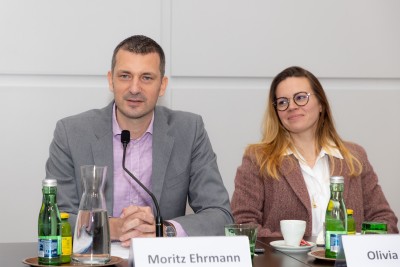Austrian Research Center Stresses Too Little Attention to Conflict Countries at COP27
The Austrian Centre for Peace research center calls for stronger cooperation as a solution for climate protection and peace. ACP emphasizes that at the COP27 (UN Climate Change Conference) the impact of the climate crisis in conflict countries was only touched upon marginally, although the pressure of the climate crisis on such countries is the highest.
 Director of the Austrian Centre for Peace (ACP) Moritz Ehrmann (l.) and Advisory Board member Olivia Lazard (r.) call for more attention to conflict countries regarding climate protection. / Picture: © ACP / Richard Tanzer
Director of the Austrian Centre for Peace (ACP) Moritz Ehrmann (l.) and Advisory Board member Olivia Lazard (r.) call for more attention to conflict countries regarding climate protection. / Picture: © ACP / Richard Tanzer
The Austrian Centre for Peace (ACP), which has decades of experience in conflict transformation, sees a great need in this area and is developing new ways to raise awareness through dialogue between conflict parties about the extent to which the climate crisis is playing existing conflicts and will continue to do so, and how cooperation can mitigate the effects for all.
In the Egyptian seaside resort of Sharm El Sheikh, UN member states spent two weeks negotiating global climate change targets. The scheduled end was Friday, but discussions around the final declaration necessitated an extension until early Sunday morning.
Among the approximately 34,000 participants was Olivia Lazard (advisory board member Austrian Centre for Peace), who noted gaps in the issues that dominated the agenda even as the conference was underway: "It's a great pity that the talks at the climate conference are not devoted to the impact of the climate crisis on conflict countries, even though they are the very ones least equipped to deal with it." By this, Lazard means, among other things, the lack of functioning structures and, above all, a lack of trust in these countries.
Moreover, evidence shows that natural resource depletion and climate impacts prolong existing conflicts and have the potential to create new hotbeds of conflict around the world. Therefore, Lazard - together with Moritz Ehrmann (Director of the Austrian Centre for Peace) - clearly argues that it is the conflict countries that need new approaches and broad support regarding climate change mitigation.
As reported by Vindobona.org, Austria calls for a fairer distribution for countries affected by the consequences of the climate crisis. "We countries in the Global North are responsible for a large share of CO2 emissions," for example the German president acknowledged. "Large parts of the Global South are particularly hard hit by the effects of the climate crisis. These countries are rightly insisting on financial support for adaptation measures and climate-related loss and damage. Austria will meet this responsibility."
"Conflicts can no longer be thought of in the same way in a world affected by climate change. Countries at war or where structures have been destroyed need support to build a minimum of trust to deal with the threats of the climate crisis, which ultimately affect everyone there," Ehrmann further sums up the problematic situation. The ACP is already working on concrete solutions in various conflict countries around the world.
Regeneration projects as an instrument for dialogue
Ehrmann cites a project that has been running since 2020 in Libya, where parts of the country have been experiencing water shortages for years due to climate and conflict.
The dialogue initiated by the ACP between stakeholders from the southern water-rich areas and those from the water-scarce cities in the north, as well as other conflict management measures, brought about an initial rapprochement to achieve better management of the water supply for the entire country. The project is currently being expanded. In addition to water supply management, dialogue around the restoration of the hydrological cycle with simple landscaping elements will ensure sustainable adaptation. The joint regeneration project thus becomes an instrument for dialogue and serves as a confidence-building measure. By asking the questions "What would happen if we worked together?" and "What would happen if everything continued as it is now?", awareness is raised and thus possible solutions are expanded. Both in terms of climate protection and in terms of existing conflicts.
In addition to Libya, the ACP will soon launch similar initiatives in other conflict regions particularly affected by climate change. Here, too, multidisciplinary cooperation is needed in the form of conflict management competence to build trust, research competence to support awareness raising, and technical and landscape planning competence to implement the projects. Director of the ACP Moritz Ehrmann addresses an appeal to existing partners, but also potential new partners: "I would like to see Austria take responsibility on these issues and play a peace-building role to mitigate the effects of climate change in conflict regions."
The Austrian Centre for Peace (ACP) is taking further action in this area by developing a training curriculum on environmental peacebuilding that is unique in Europe. At the beginning of next year, the training - to train and strengthen other actors active in this field (EU and UN missions, NGOs, etc.) - will be presented.



